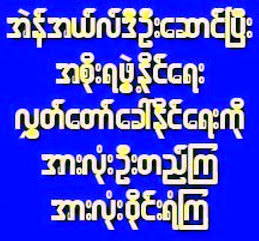| Building on a report he issued earlier in the month, the United Nations' Human Rights Envoy for Burma yesterday appealed to the international community to take a common stand and engage Burma on its long road to democracy. Tomás Ojea Quintana, appointed to his position only this May, cautioned delegates in the United Nations General Assembly's third committee that the realization of democracy in Burma would take considerable time, but it was imperative that the international community come to the assistance of the country to ensure that progressive benchmarks along the path are achieved. "Restoration of full democracy cannot happen overnight; it will take generations," Quintana said, adding that it was insufficient for the United Nations to simply issue resolutions on the situation in the Southeast Asian country, instead insisting that resources must also be made available so that the goals of resolutions may be met. "Nothing can be achieved in isolation and condemnation, while there are possibilities for engagement, encouragement and cooperation," noted Quintana, referring to a common theme of his report following his inaugural visit to the country in August. In order for the proposed 2010 general election in Burma to be a success, Quintana has repeatedly put forth four elements which must be implemented: the revision of domestic laws that limit fundamental rights, the progressive release of political prisoners, military reform, and alterations to ensure an independent judiciary. The Special Envoy stressed that as the process unfolds, the promotion of human rights must not be subjected to double standards or politicization. Yet, while Quintana pled for an international community with one voice on Burma, the exchange between delegates following the Envoy's delivery again highlighted stark divisions within the international community. Burma's representative, Ambassador Thaung Tun, was overall appreciative of the Rights Envoy's speech, though reserving criticism for what he termed regurgitation of baseless exile claims against the government and excessive criticism of the junta's response to Cyclone Nargis in May. Representatives from Japan and Thailand also spoke appreciatively of Quintana's assessment, preferring to focus on opportunities ahead for cooperation and successes to date. However, the European, North American and New Zealand delegates offered by in large dubious assessments of the chances of healing Burma's wounds if the international community were to heed the Special Envoy's proposed prescription. Additionally, twice, in reference to responses from the representatives of the United States and United Kingdom, the Chair was forced to intervene to request that delegates refer to the country as Myanmar, as that is the name for the country officially recognized by the United Nations. Summing up his analysis of the situation, the Rights Envoy told reporters afterward, "To get a civil Government will take time. They are not prepared for that. They are prepared for war." |
ျမန္မာႏုိင္ငံအတြင္း ဒီမုိကေရစီ ျပဳျပင္ေျပာင္းလဲေရးဟာ အခ်ိန္ၾကာႏုိင္ၿပီး စစ္အစိုးရက အရပ္သား အစိုးရတရပ္ အုပ္ခ်ဳပ္ႏုိင္ေအာင္ ျပင္ဆင္တာမ်ဳိး မရွိတဲ့အေၾကာင္း ကုလသမဂၢရဲ႕ ျမန္မာႏုိင္ငံဆုိင္ရာ လူ႔အခြင့္အေရး စုံစမ္းစစ္ေဆးသူ တိုမာ့တ္စ္ အိုေဟး ကင္တာနား (Thomas Ojea Quintana) က ေ၀ဖန္ ေျပာဆုိပါတယ္။ တခ်ိန္တည္းမွာ စစ္အစိုးရ က်င္းပခဲ့တဲ့ အမ်ဳိးသား ညီလာခံဟာ အတုအေယာင္ ျဖစ္တယ္လုိ႔ ေ၀ဖန္လုိက္ၿပီး စစ္အစိုးရအေနနဲ႔ သူ အဆုိျပဳထားတဲ့ ႏုိင္ငံေရးျပဳျပင္ေျပာင္းလဲမႈ အခ်က္ေလးခ်က္ကို လုပ္ေဆာင္ဖို႔ ထပ္မံ တိုက္တြန္းလိုက္ပါတယ္။
မေန႔က ကုလသမဂၢ ဌာနခ်ဳပ္မွာ က်င္းပတဲ့ သတင္းစာရွင္းလင္းပြဲမွာ ျမန္မာႏုိင္ငံဆုိင္ရာ လူ႔အခြင့္အေရး စုံစမ္းစစ္ေဆးသူ တိုမာ့တ္စ္ ဟိုေဟး ကင္တာနား က ျမန္မာႏုိင္ငံအတြင္းမွာ လြတ္လပ္စြာ ေျပာဆုိခြင့္၊ ထုတ္ေဖၚခြင့္၊ စည္းရုံးခြင့္ စတဲ့ ႏုိင္ငံေရး အခြင့္အေရးေတြ ဆုံးရႈံးေနတဲ့ အေၾကာင္း၊ စစ္အစိုးရဘက္က ႏုိင္ငံတကာက လက္ခံတဲ့ ႏုိင္ငံေရး အေျပာင္းအလဲေတြ လုပ္မယ္ဆုိရင္ အေျခခံ ျပဳျပင္ေျပာင္းလဲမႈေတြ လုပ္ဖို႔ လိုတဲ့အေၾကာင္း အဓိက ေျပာသြားတာ ေတြ႔ရပါတယ္။
အရပ္သားအစိုးရတရပ္ ေပၚေပါက္ေရးနဲ႔ပတ္သက္လို႔ -
 |
| ကုလသမဂၢ ျမန္မာႏိုင္ငံဆုိင္ရာ လူ႔အခြင့္အေရး စံုစမ္းစစ္ေရးေရးမွဴး တိုမာ့တ္စ္ အိုေဟး ကင္တားနား |
လူ႔အခြင့္အေရး အေျခအေန တုိးတက္ေကာင္းမြန္ဖို႔ ဆုိရင္ ႏုိင္ငံတကာက သတ္မွတ္ထားတဲ့ လူ႔အခြင့္အေရး စံႏႈန္းေတြနဲ႔ ကိုက္ညီေအာင္ ျပည္တြင္း ဥပေဒေတြကို ျပင္ဆင္ဖုိ႔၊ ႏုိင္ငံေရး ယုံၾကည္ခ်က္ေၾကာင့္ ဖမ္းဆီးခံထားရတဲ့ သူေတြကို ျပန္လႊတ္ေပးဖို႔ စစ္တပ္ကို လူ႔အခြင့္အေရး သတင္တန္းေတြ ေပးၿပီး ျပဳျပင္ေျပာင္းလဲဖို႔ နဲ႔ လြတ္လပ္တဲ့ တရားစီရင္မႈ နဲ႔ တရားဥပေဒ စိုးမုိးေအာင္ လုပ္ေဆာင္ဖုိ႔ အၾကံေပးထားပါတယ္။ ဒီအၾကံေပးခ်က္ေတြကို မလုိက္နာရင္ စစ္အစိုးရအေပၚ ႏုိင္ငံတကာက အသိအမွတ္ျပဳမွာ မဟုတ္ဘူးလို႔လည္း ေျပာဆုိသြားပါတယ္။
“က်ေနာ့္ အစီရင္ခံစာမွာ က်ေနာ္ ေျပာထားပါတယ္။ စစ္အစိုးရ က်င္းပတဲ့ အမ်ဳိးသားညီလာခံ ဟာ အတုအေယာင္ အမ်ဳိးသားညီလာခံ ျဖစ္တယ္ ဆုိၿပီး၊ ဒီကိစၥက ရွင္းပါတယ္။ ျမန္မာႏုိင္ငံ အတြင္းမွာ ေရာက္ခဲ့တဲ့ အတြက္လည္း ဒီကိစၥကို က်ေနာ္ စုံစမ္းႏုိင္ပါတယ္။ က်ေနာ္ အဆုိျပဳထားတဲ့ အခ်က္ေလးခ်က္က ျမန္မာစစ္အစိုးရအေနနဲ႔ ဒီမုိကေရစီ တည္ေဆာက္ေရး ဘာပဲလုပ္လုပ္၊ ဖြဲ႔စည္းပုံေရးဆြဲေရးပဲ လုပ္လုပ္ ဒီအခ်က္ေတြကို အေကာင္အထည္ မေဖာ္ဘူးဆုိရင္ ႏိုင္ငံတကာက အသိအမွတ္ျပဳမွာ မဟုတ္ပါဘူး။”
ေဒၚေအာင္ဆန္းစုၾကည္ကို ခ်ဳပ္ေႏွာင္ထားတာနဲ႔ ပတ္သက္လို႔လည္း မစၥတာ ကင္တားနားက -
“က်ေနာ့္ ရႈျမင္ခ်က္ကေတာ့ ေဒၚေအာင္ဆန္းစုၾကည္ ဟာ တဖက္သတ္ စစ္အစိုးရဘက္က သူ႔သေဘာနဲ႔သူ ခ်ဳပ္ေႏွာင္ ထားတာကို ခံထားရတာပါ။ မွ်မွ်တတ တရားစီရင္တာကို မခံရဘူးလို႔ က်ေနာ္ ျမင္ပါတယ္။ အခု ေဒၚေအာင္ဆန္းစုၾကည္ရဲ႕ ေရွ႔ေနက အယူခံ ၀င္ထားတယ္လုိ႔ က်ေနာ္ သိပါတယ္။ စစ္အစိုးရအေနနဲ႔ ဒီကိစၥကို အေရးတယူ ျပန္လည္ျပဳျပင္ၿပီး မွ်မွ်တတ စဥ္းစားမယ္၊ ခ်က္ျခင္း လႊတ္ေပးလိမ့္မယ္လို႔ ေမွ်ာ္လင့္ပါတယ္။”
ျမန္မာႏုိင္ငံအတြင္း မုန္တုိင္းေဘး ကယ္ဆယ္ေရး လုပ္ငန္းေတြတြက္ လူသားခ်င္းစာနာေထာက္ထားမႈအကူအညီေတြ ဆက္ၿပီး လိုအပ္ေနဆဲ ျဖစ္တဲ့အေၾကာင္းနဲ႔ တခ်ိန္တည္းမွာ လူ႔အခြင့္အေရး အေျခအေနကိုလည္း ပစ္ပယ္ထားလို႔ မရတဲ့အေၾကာင္း မစၥတာ ကင္တားနားက ေျပာသြားပါတယ္။ သူ႔ရဲ႕ ျမန္မာႏုိင္ငံ ခရီးစဥ္အတြင္း အက်ဥ္းေထာင္ေတြကို လြတ္လြတ္လပ္လပ္ သြားခြင့္ရဖုိ႔ စစ္အစုိးရ အာဏာပိုင္ေတြနဲ႔ အႀကိတ္အနယ္ ေဆြးေႏြးခဲ့ရတာေတြ ရွိတဲ့အေၾကာင္း ကိုလည္း ထည့္သြင္းေျပာဆုိသြားပါတယ္၊ ကုလသမဂၢဟာ ျမန္မာစစ္အစိုးရကို အထီးက်န္ ၀ိုင္းပယ္ခံ ထားရတာကေန ကယ္ထုတ္ဖို႔ ႀကိဳးစားတာ ျဖစ္တယ္ဆုိတာ စစ္အစိုးရ နားလည္ဖုိ႔ လိုတဲ့အေၾကာင္းေတြကို သတင္းစာရွင္းလင္းပြဲမွာ ေျပာဆုိသြားပါတယ္။
















